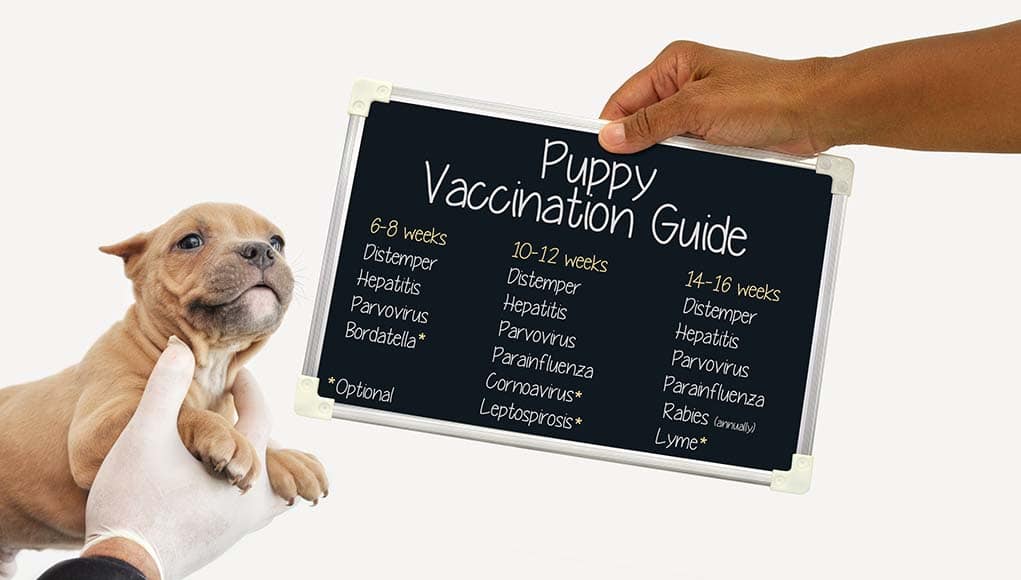
A puppy shot schedule is something that indirectly helps keep your dogs safe and also keeps you from getting confused because it helps you keep track of all the vaccines and the time you have to get your dog vaccinated.
A puppy shot schedule is made by your vet that prepares a schedule of all the vaccines that your dog needs to get in order to maintain proper health throughout its life and not contract any disease or illness like canine distemper or canine hepatitis. You would obviously not want your dog contracting these diseases as that would just be very bad for your dog and you both.
Our dogs are someone who we do not want to lose ever. Their lifespans are much shorter than us humans but we wish they were as long as ours, don’t we? There are sometimes also the issues of your dog getting some health issues and leaving the world of the living much before their natural death age comes.
So if there is an opportunity for your dog to avoid all these things that might even result in its early demise, shouldn’t you take it? It will just keep you and your dog happy for all your life and you will not have to see your pet suffer from something that could have been avoided easily if you had just put some effort into making it happen.
When you get a dog, you are just getting an addition to your family and you never want to see anyone in your family being unhealthy or unhappy. So I am going to be talking about the puppy shot schedule in this article. I’ll talk about what vaccines are, which vaccines should be given to your puppies, the optional vaccines, and much more about the diseases.
What Is Dog Vaccine?
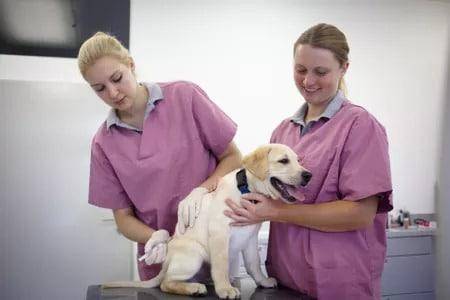
If you are a reader from the year 2020 or even 2021, the ‘vaccine’ is the word that you must have heard a lot in these years. However, we all are familiar with vaccines for different diseases caused in humans but what is this a thing called a dog vaccine?
It is not the case that people have completely zero knowledge about dog vaccines. Most new dog owners are also aware of their first puppy shot schedule, but still, there are a lot of things that a dog owner should know.
Thanks to diseases like polio or the coronavirus outbreak over the world, we have a general idea of what vaccines are. For those who don’t know, don’t worry, I have got you covered. A vaccine is a mild dose of the organism of the disease you want your dog to fight with which is injected into the body to make their body immune to that particular disease.
These vaccines for different diseases will help your dog to build its immunity against diseases. However, if it sounds strange to you that we inject a dose of an organism that causes disease into your dog’s body to offer protection against it, don’t worry about that.
The vaccine contains antigens as the primary element. This antigen is a duplicate copy of the organism of the disease which is sent into the body. The important benefit this antigen offers is, they are completely harmless despite being similar to the one which causes the actual disease.
Thus, this vaccine helps your dog’s body to practice defeating the foreign organism so that the body is ready when it comes to fighting the actual disease.
What Are Booster Injections?

Booster injections are similar to vaccines or we can say are a kind of vaccine. As puppies get vaccinated as per puppy shot schedule, similarly an adult dog is required to get booster injections under the dog vaccination schedule. It is an additional dose of vaccine your dog will have to take in its adulthood.
The vaccines given to the puppies are not designed to offer protection against diseases throughout life. Those vaccines will surely build strength and immunity to fight against diseases but the protection fades away after certain years.
Therefore, to maintain the protection for the entire life, a booster dose is given to dogs. Generally, these boosters are required to be shot annually for most diseases. This means the dog vaccination schedule is planned for adult dogs.
There is a term ‘titer testing’ that often gets associated with the booster injection because some people like to get the titer testing done before they get their dogs vaccinated with the booster injections. I have explained about the booster injections and titer testing a bit more later in this article, read on to find out more.
Are Vaccines Or Puppy Shot Schedules Important For Your Dog?

A vaccine is like life insurance for your dog, it prepares them for the future threat that may or may not be there. The vaccines are important for dogs because animals suffer from way more diseases than we humans do. Thus keeping your dog’s health first, you don’t want them to spend most of the time fighting with different diseases.
No matter if you own a puppy or a well-grown adult dog, you will have to complete vaccination in some form or another. If you get a newborn puppy into your home, then the veterinary doctor must have handed over the puppy shot schedule to you.
It is not that only puppies need vaccines, even adult dogs require some kind of post-vaccination dose. Adult dogs require booster injections or titers. Thus, follow the puppy shot schedule for your puppy and follow the dog vaccination schedule for grown-up adult dogs.
Also, vaccinations are now an important and compulsory part of your and your dog’s life. If you want to take your puppy to a training school or a dog daycare service, you will need to show proof of vaccinations.
Which Shots Do Puppies Need?
It is extremely important for a puppy to get the vaccination done in its puppyhood itself. It will save your puppy from almost all preventable diseases and illnesses. Vaccinate your puppy and he will thank you for his rest of the life.
When you get a new puppy, the first thing you need to do is get a puppy shot schedule made by a veterinary doctor also known as a vet. This puppy shot schedule will cover all the important vaccines you need to get for your puppy.
However, you can include other optional vaccinations in your puppy shot schedule. Consult a veterinary doctor to get more clarity about different vaccinations. The puppy shot schedule will include different vaccinations which are required to be taken at a specific age of your puppy.
With so many different vaccinations present, it can be confusing to a new dog owner. I am listing down a few important as well as optional vaccinations you can get your puppy vaccinated from.
Necessary Vaccinations
- Canine Distemper
- Canine Parvovirus
- DHPP
- Rabies
- Infectious hepatitis
In no case, any of the above-mentioned vaccinations should be skipped. It is advisable to get your puppy vaccinated from these diseases and are always included in your puppy shot schedule.

Optional But Recommended Vaccinations
- Influenza
- Bordetella
- Leptospirosis
- Lyme disease
- Coronavirus (Not Covid-19)
These are some of the optional vaccinations which you may or may not consider as per your dog’s health and lifestyle. Consult with your vet to include any of the vaccines in your puppy shot schedule.
It is important for an owner to have a basic knowledge of which vaccinations their dog needs and which do not. All vaccines have different costs hence do not spend your money on unnecessary vaccinations as well as do not compromise on important ones.
The Ideal Puppy Shot Schedule
Have you brought a cute little puppy recently? If yes, then the very first thing it should do is visit your Veterinary doctor. The first year is a very crucial period for your puppy. Hence, ask your vet to design a puppy shot schedule as soon as you get a new puppy.
The young puppies are weak and in the state where they are still building their immune system. Thus, vaccination in such a period is necessary during puppyhood and should be carried out in the first 1 year of their age.
The reason I mentioned ‘Ideal puppy shot schedule’ is because there is not just one standard puppy shot schedule for all the dogs. Every dog is different according to its breed, country, and lifestyle.
The vaccines needed to vary according to these factors and there is no need to randomly throw all the vaccines on your dog. It’s all up to you, which vaccines you want for your dog. I would advise you to consult a vet and decide accordingly.
A puppy shot schedule includes different vaccines selected by you and the time period or the age at which your dog should be vaccinated with a particular vaccine. All vaccines require different ages to work effectively and the puppy shot schedule is planned accordingly.
This puppy shot schedule will vary with the vaccines you choose as well as with the age of your dog. The puppy shot schedule is given below to get a basic idea of the same.
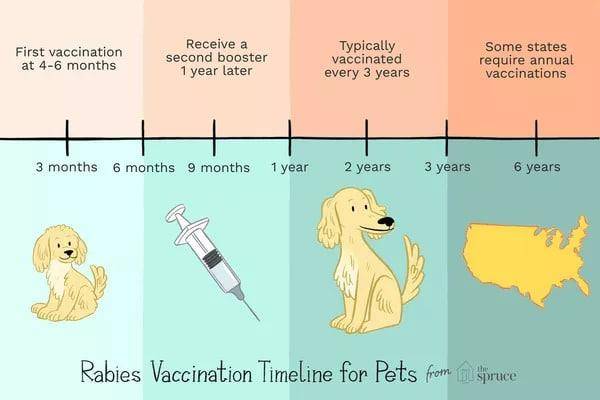
Puppy Shot Schedule
| Shot | Dog’s Age | Vaccine |
| 1st Shot | 6-8 Weeks | Canine Distemper
Canine Parvovirus Bordetella |
| 2nd Shot | 10-12 Weeks | Distemper
Adenovirus (hepatitis) Parainfluenza Parvovirus |
| 3rd Shot | 16-18 Weeks | Rabies
Influenza |
| 4th Shot | 12-16 Months | DHPP
Rabies Coronavirus Leptospirosis Bordetella Lyme disease |
| 5th Shot | Every 1-2 years (Booster) | Influenza
Coronavirus Leptospirosis Bordetella Lyme disease |
| 6th Shot | Every 1-3 Years | Rabies |
Please note: that this puppy shot schedule given above is not a piece of medical advice. Always consult your vet before beginning any vaccination program for your dog.
The above puppy shot schedule includes both, vaccines required as a puppy and booster dose required as an adult dog. Whereas, the vaccination and booster doses can be planned separately and depends on your veterinary doctor.
You may have noticed that there are a lot of vaccines for a small puppy. Well yes, but these vaccines are necessary for your dog and its healthy life. To be honest, you will have to visit your vet frequently during its puppyhood but the benefits are a lot more than a slight inconvenience.
We have already seen the number of vaccines and the number of shots you will have to get for your dog for its entire life. Almost 90% of these vaccines are required to be given in the first 1-2 years of your dog’s life.
Being a dog lover, most people will ignore the time they will have to spend for this necessary puppy shot schedule program but the important question is, how much will you have to pay for the puppy shot schedule program? Let us find out.
How Much Do Vaccines In Puppy Shot Schedule Cost?

The puppy shot schedule only includes vaccines that are required during its puppyhood. Whereas, the booster injections and titers are part of the dog vaccination schedule. However, for your convenience, we will discuss the cost for both here.
We have seen that puppy shot schedules can be different for different dogs and so does the costs. Costs vary greatly with the region you live in, the vaccines you choose, your veterinary doctor, and many more factors.
If you live in some rural area, chances are your vet will charge less for the same dose of vaccine where the vet situated in an urban area with more crowd will charge. You will get to see a major difference region wise.
The cost of total vaccination as per puppy shot schedule will cost you somewhere around 75$ to 100$ in a 1.5 to 2 year period. This includes the first three shots which are 6-8 weeks, 10-12 weeks, and 16-18 week shots.
Additionally, the vaccine for rabies is given every 1-3 years which costs $15 to $20 which is excluded from the puppy shot schedule vaccination program.
All these costs might sound expensive to you but these prices are to be paid at each shot. Thus the cost gets divided into installments which reduces the burden on the owner’s shoulders. However, you can save a little bit more by using cheaper alternatives.
These alternatives include consulting a local or cheaper vet instead of the one who charges more. You can also get your dog vaccinated from animal shelters. These shelters often offer vaccination at costs as low as $20 or sometimes even free!
Vaccinations For Adult Dogs
Like I mentioned before, it is essential that your dog get some boosters and titers after it has aged because the effects of the vaccine do not last for the whole life of the dog. There are a lot of differences in the opinions of the vets that whether a dog should get vaccinated every year or not.
Some of the vets believe that if a dog is given a lot of vaccines then it might pose a lot of health issues for the dog and put it under unnecessary risks. While these vets believe that, some of the other vets absolutely disagree with that statement. They say that it is necessary that your dog get all the help it can get to fight the diseases.
These vets say that when the dogs are given vaccines every year, it is going to prevent your dog from getting some of the very dangerous diseases like the distemper. So that is why it becomes necessary that you talk with your vet to make sure that your dog is getting all the protections that it is necessary for it to have.
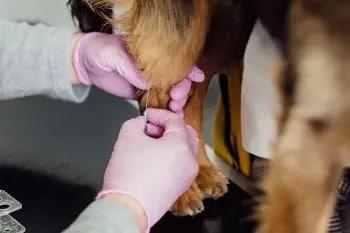
Titer Tests
There are a lot of dog owners that will opt for something called the titer test before they get the vaccines administered to their dogs. These titer tests are done before every annual vaccination. What these titer tests do is measure the immunity level of your dog and that tells how weak or strong your dog is, how likely it is to contract a disease, and some other things.
Doing these titer tests will help you determine whether a dog is susceptible to a disease or not and whether it needs to get vaccinated for any particular disease or a number of diseases. Although, this test is not always helpful because there is one exception to this when it comes to rabies.
Rabies is an exception to these tests because regardless of whether your dog is susceptible to rabies or not, some of the states in America require you to vaccinate your dog against rabies by law and if you do not do it, it can have many consequences.
Getting To Know The Diseases
Now that you know about what the vaccines are, what the puppy shot schedule will be, and how much will everything cost, let us talk about the diseases that these vaccines will prevent in detail.
Sometimes, when people go to get the vaccines for their dogs repeatedly, they get bored after a while and stop following the puppy shot schedule. Bored might not be the correct word but they just do not like all the fuss that they have to do and think that the dogs on the streets survive without any of that, so our dogs can too.
If you are someone who thinks like that then you are making a huge mistake. If you do not follow the puppy shot schedule, your dog might get some disease that might be fatal for it. But these diseases are preventable and prevention has always been better than cure, so why not just follow the schedule that has been set by your vet?
There are a lot of diseases and a lot of illnesses and hence, a lot of vaccinations are available for them all and that is the reason things might get confusing sometimes as to what you have to do and if you do not get a puppy shot schedule from your vet, it would become problematic. Here are some of the diseases that you will have to get your dog vaccinated for:
Canine Distemper
- This disease, also called hard pad, is severe and contagious that is caused by a virus that attacks the respiratory gastrointestinal, and nervous systems in a dog and even some other species as well.
- Canine distemper spreads through airborne exposure, that is from coughing or sneezing from another animal that is infected. It can also get transmitted if the dog shares its food or water bowls with other animals.
- This disease can cause discharge in the eyes and nose, fever, coughing, vomiting, diarrhea, seizures, twitching, paralysis, and sometimes even death.
Canine Hepatitis
- This is an infectious disease which is a very contagious viral infection that affects the kidneys, spleen lungs, and eyes of the dogs.
- This disease is formed in the liver and it is also different from hepatitis that is found in humans.
- The symptoms are slight fever, congestion of mucous membranes, vomiting, jaundice, stomach enlargement, pain around the liver, etc. This disease can be fatal.
Bordetella Bronchiseptica
- This is a highly infectious bacteria that can cause very heavy coughing fits in your dogs as well as whooping, vomiting, seizure, and even sometimes death.
- It is one of the main causes of kennel cough. The vaccines that are available for this are injectable as well as nasal.
- Canine Parainfluenza, which is another disease somewhat related to this is one of the viruses that can help give rise to the kennel cough.
- If you have planned that you will board your puppy, make it attend group training classes, or are going to be using dog daycare services, then they will ask for proof of vaccination for this disease.
Canine Coronavirus
- This is not the Covid-19 virus as that does not happen in dogs. Canine coronavirus affects the gastrointestinal system in dogs.
- The canine coronavirus can also happen in your dog’s respiratory system or rather, it can cause issues in the respiratory system.
- The symptoms are loss of appetite, vomiting, diarrhea, etc. They need to be kept hydrated, warm, comfortable and be helped in alleviating their nausea when this happens.
Heartworm
- Heartworm has no definite preventive vaccine but it can be prevented used regular medication that your vet will prescribe.
- This disease is when worms form a home in the right side of the heart and pulmonary arteries but they can travel to other parts of the body and get into the lungs and kidneys as well.
- These worms can grow up to 14 inches long and can block and injure organs in your dog. Symptoms at the later stages include coughing, loss of appetite, difficulty in breathing, etc.
Kennel Cough
- As called tracheobronchitis, it is an inflammation in the upper side of the respiratory tract and is caused by Bordetella, canine parainfluenza, etc.
- It is often a mild disease that causes dry coughing but sometimes it could lead to retching and gagging as well.
- This can be a deadly disease and can spread amongst dogs very fast. Antibiotics become necessary when the chronic cases become severe.
Leptospirosis
- Leptospirosis is caused by bacteria and sometimes the dogs might not show any symptoms of this disease. This can be found anywhere in the world in soil and water.
- This disease can spread from dogs to humans as well and hence is called a zoonotic disease.
- Symptoms can be fever, vomiting, abdominal pain, diarrhea, loss of appetite, weakness, lethargy, stiffness, jaundice, muscle pain, infertility, kidney failure, liver failure, etc.
- Antibiotics can help with this and they should be administered as soon as possible.
Lyme Disease
- Lyme disease is also known as borreliosis and is an infectious, tick-borne disease and can be transmitted through ticks and it is caused by spirochete which is a bacteria.
- The dogs will start limping as their lymph nodes swell and temperature rises and then stops eating as well.
- This can affect the dog’s heart, kidney, joints, etc and it can also lead to neurological disorders. Antibiotics are very helpful and should be given as soon as possible,
Parvovirus
- It is a very contagious virus that will affect every dog but if your dog is unvaccinated and younger than 4 months it will contract this virus very easily.
- It affects the gastrointestinal system and causes loss of appetite, vomiting, fever, diarrhea, etc. It can cause severe dehydration that can even kill the dog within 2 to 3 days.
- It does not have a cure so you should always keep your dog hydrated and try to control all the secondary symptoms and hope for the best to happen because dogs can beat it if their immune systems are strong enough.
Rabies
- This is a viral disease that affects the central nervous system and causes headaches, anxiety, hallucinations, excessive drooling, fear of water, paralysis, and eventually death as well.
- It is transmitted through bites of a rabid animal and it has to be treated within hours of the bite happening otherwise the dog might die soon.
- This is an essential vaccination in most of the states in the US and you should check about it with your vet.
All of these diseases can be vaccinated against and you should visit your vet very soon after getting your new dog to set up the puppy shot schedule as it will help your dog immensely. Getting your pet dog vaccinated against all these diseases by paying a certain fee will be worth it if you get to have your dog healthy and happy for all your life.
It is essential that all the vaccinations for these diseases get done within the first year after your dog is born so that it does not get any of the diseases and is free to do whatever it wants because it will be in a very healthy condition.
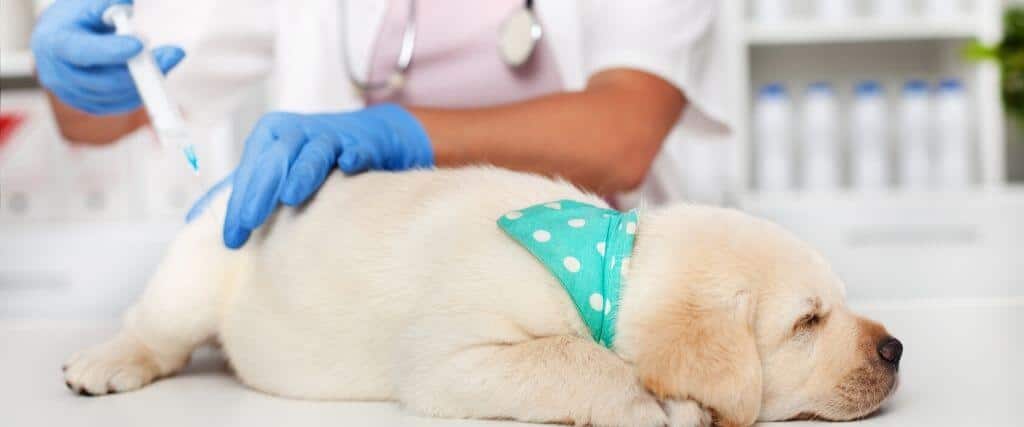
Cessation | Puppy Shot Schedule
A puppy shot schedule is a schedule made to get all the vaccines that your dog is required to take to maintain its health all its life. It is necessary that you get this schedule made by your vet for your pet and null all the possibilities of having to see your dog suffer from any diseases that could have been prevented.
A puppy shot schedule tells you what type of vaccine your dog needs to get at what stage of its life and it tells you all about the diseases that it will prevent. The vaccines that your dog will have to take might differ from some other dog’s vaccine and that is because various things are considered when your vet prescribes these vaccines.
The prescription depends on the living conditions of the dog, its breed, and a lot of other things. There are some optional vaccines and some mandatory vaccines so make sure you talk to the vet about all these things and also take into consideration things like the prices of the vaccines.
The vaccines can prevent diseases like rabies, heartworm, Lyme disease, coronavirus, kennel cough, parvovirus, and many other canine diseases as well. So if you want your dog to be healthy and happy, do not even consider not getting these vaccinations done for your dog.
Dogs are after all a part of our family and might even be our best friends and if we cannot take care of such adorable family members, do we even deserve them? That is something you will have to answer for yourself because there is only so much a person can explain to you. Just make sure to get the puppy shot schedule from your vet and follow it and all will be well.

